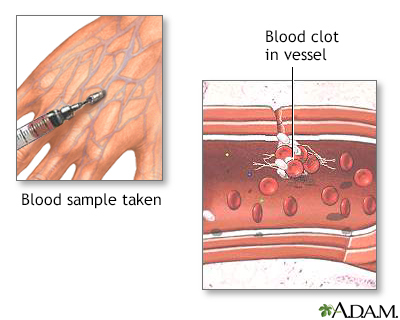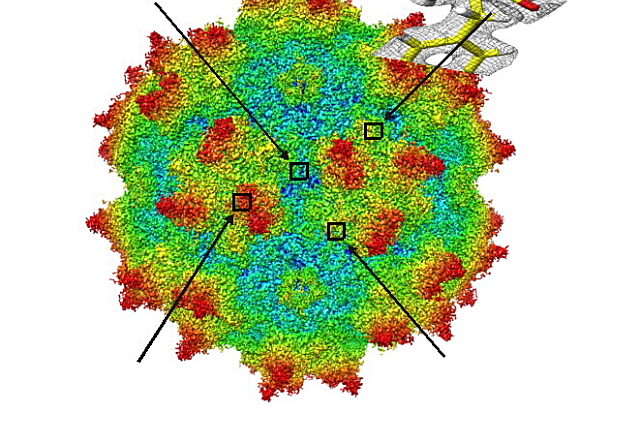- Investigator
- Tung T Wynn
- Status
- Accepting Candidates
Hemophilia A
Definition
Hemophilia A is a hereditary bleeding disorder caused by a lack of blood clotting factor VIII. Without enough factor VIII, the blood cannot clot properly to control bleeding.
Alternative Names
Factor VIII deficiency; Classic hemophilia; Bleeding disorder - hemophilia A
Causes
When you bleed, a series of reactions take place in the body that helps blood clots form. This process is called the coagulation cascade. It involves special proteins called coagulation, or clotting, factors. You may have a higher chance of excess bleeding if one or more of these factors are missing or are not functioning like they should.
Factor VIII (eight) is one such coagulation factor. Hemophilia A is the result of the body not making enough factor VIII.
Hemophilia A is caused by an inherited X-linked recessive trait, with the defective gene located on the X chromosome. Females have two copies of the X chromosome. So if the factor VIII gene on one chromosome does not work, the gene on the other chromosome can do the job of making enough factor VIII.
Males have only one X chromosome. If the factor VIII gene is missing on a boy's X chromosome, he will have hemophilia A. For this reason, most people with hemophilia A are male.
If a woman has a defective factor VIII gene, she is considered a carrier. This means the defective gene can be passed down to her children. Boys born to such women have a 50% chance of having hemophilia A. Their daughters have a 50% chance of being a carrier. All female children of men with hemophilia carry the defective gene.
Risk factors for hemophilia A include:
- Family history of bleeding
- Being male
Symptoms
Severity of symptoms vary. Prolonged bleeding is the main symptom. It is often first seen when an infant is circumcised. Other bleeding problems usually show up when the infant starts crawling and walking.
Mild cases may go unnoticed until later in life. Symptoms may first occur after surgery or injury. Internal bleeding may occur anywhere.
Symptoms can include:
- Bleeding into joints with associated pain and swelling
- Blood in the urine or stool
- Bruising
- Gastrointestinal tract and urinary tract bleeding
- Nosebleeds
- Prolonged bleeding from cuts, tooth extraction, and surgery
- Bleeding that starts without cause
Exams and Tests
If you are the first person in the family to have a suspected bleeding disorder, your health care provider will order a series of tests called a coagulation study. Once the specific defect has been identified, other people in your family will need tests to diagnose the disorder.
Tests to diagnose hemophilia A include:
- Prothrombin time
- Partial thromboplastin time (PTT)
- Serum factor VIII activity
Treatment
Treatment includes replacing the missing clotting factor. You will receive factor VIII concentrates. How much you get depends on:
- Severity of bleeding
- Site of bleeding
- Your weight and height
Mild hemophilia may be treated with desmopressin (DDAVP). This medicine helps the body release factor VIII that is stored within the lining of blood vessels.
To prevent a bleeding crisis, people with hemophilia and their families can be taught to give factor VIII concentrates at home at the first signs of bleeding. People with severe forms of the disease may need regular preventive treatment.
DDAVP or factor VIII concentrate may also be needed before having dental extractions or surgery.
You should get the hepatitis B vaccine. People with hemophilia are more likely to get hepatitis B because they may receive blood products.
Some people with hemophilia A develop antibodies to factor VIII. These antibodies are called inhibitors. The inhibitors attack factor VIII so that it no longer works. In such cases, a man-made clotting factor called VIIa can be given.
Support Groups
You can ease the stress of illness by joining a hemophilia support group. Sharing with others who have common experiences and problems can help you not feel alone.
Outlook (Prognosis)
With treatment, most people with hemophilia A are able to lead a fairly normal life.
If you have hemophilia A, you should have regular checkups with a hematologist.
Possible Complications
Complications may include:
- Long-term joint problems, which may require a joint replacement
- Bleeding in the brain (intracerebral hemorrhage)
- Blood clots due to treatment
When to Contact a Medical Professional
Contact your provider if:
- Symptoms of a bleeding disorder develops
- A family member has been diagnosed with hemophilia A
- You have hemophilia A and you plan to have children; genetic counseling is available
Prevention
Genetic counseling may be recommended. Testing can identify women and girls who carry the hemophilia gene. Identify women and girls who carry the hemophilia gene.
Testing can be done during pregnancy on a baby in the mother's womb.
Gallery

References
Carcao M, Moorehead P, Lillicrap D. Hemophilia A and B. In: Hoffman R, Benz EJ, Silberstein LE, et al, eds. Hematology: Basic Principles and Practice. 7th ed. Philadelphia, PA: Elsevier; 2018:chap 135.
Scott JP, Flood VH. Hereditary clotting factor deficiencies (bleeding disorders). In: Kliegman RM, St. Geme JW, Blum NJ, Shah SS, Tasker RC, Wilson KM, eds. Nelson Textbook of Pediatrics. 21st ed. Philadelphia, PA: Elsevier; 2020:chap 503.
Related specialties
Clinical Trials: Hemophilia A
UF Health research scientists make medicine better every day. They discover new ways to help people by running clinical trials. When you join a clinical trial, you can get advanced medical care. Sometimes years before it's available everywhere. You can also help make medicine better for everyone else. If you'd like to learn more about clinical trials, visit our clinical trials page. Or click one of the links below:
- Investigator
- Tung T Wynn
- Status
- Accepting Candidates
Community and Patient Programs: Hemophilia A
Our community and patient programs provide great value to patients, families and loved ones. People can find support, educational materials, expert consultants and more. In most instances, these programs are offered free of charge.
-
Camp Boggy Creek
Children with serious illnesses can enjoy a camp experience in a safe, medically sound environment.
News and Patient Stories: Hemophilia A
Sickle Cell Loses and Sydnee Wins
“I’m active, a little bit crazy, but I’m mostly fun,” Sydnee Murphy, 8, said when asked to describe herself. Sydnee is a second grader at Westside Elementary…

UF Health researchers, collaborators get unprecedented view of gene therapy virus
September 17, 2018
Researchers from University of Florida Health and the Salk Institute have obtained an unprecedented view of a gene-delivery virus, paving the way for further…
Department of Biochemistry and Molecular Biology, Florida Blue Center for Health Care Quality, +4 more

Latest podcast episodes
Power of plants can help people who have hemophilia
Hemophilia, a disease linked with legends of European monarchs, frail heirs and one flamboyant charlatan called...